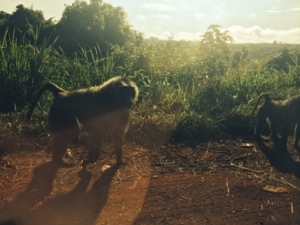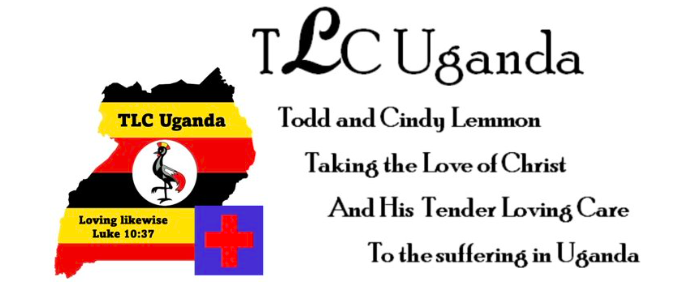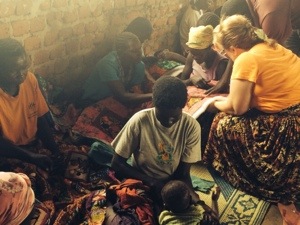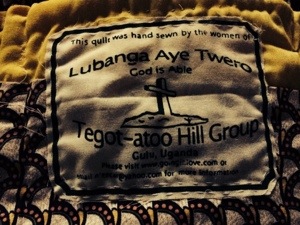Day Nine, April 23:
We got up with the roosters and were ready to depart at dawn (7am). Nancy Cordoza made us a lovely breakfast, an omelette of fresh local eggs, onions and tomatoes with avocado, bananas with odie (G-nut sauce), and oranges which I picked off the tree in her front yard. Talk about fresh organic produce! I could easily get used to this.
Saying goodbye, however, especially to such a sweet new friend, was bitter. We drove away leaving her to her ministry as we started out for Jinja.
 We left by way of the same road on which we had arrived, and travelled through Kamdini, the town in which Anthony and I had eaten on the way to Gulu. We crossed over the Nile River at the site of the future Karuma Hydroelectric Project as we had done before. This time I got better pictures. After we crossed, we encountered dozens of baboons lining the highway. As I raised my iPhone to take pictures, one lunged toward it as if I was offering it as food. This got a laugh out of Anthony and reminded Cindy to roll up her window.
We left by way of the same road on which we had arrived, and travelled through Kamdini, the town in which Anthony and I had eaten on the way to Gulu. We crossed over the Nile River at the site of the future Karuma Hydroelectric Project as we had done before. This time I got better pictures. After we crossed, we encountered dozens of baboons lining the highway. As I raised my iPhone to take pictures, one lunged toward it as if I was offering it as food. This got a laugh out of Anthony and reminded Cindy to roll up her window.

At a construction stop, we were rushed by merchants capitalizing on the captive audience. Bottles of cold beverages were thrust into my open window, as Anthony inquired about a local treat, roasted cassava, which was promptly produced. A brief exchange of currency and a wave of the flag man later, we were off again, and Anthony and I enjoyed our early lunch.
A well-timed potty break stopped us at the exact same petrol station at which we had stopped before, just outside Bweyale town. We passed through Luwero, a busy town, where we turned off the main road. Shortly after that, we found the biggest, most amply fruited mango trees I have ever seen. Anthony said these from this region are especially good, so we stopped and bought several from a woman selling them at the street.
We took a short-cut down Zirobwe Rd. that Anthony swore would shorten our drive by 50km. The problem with this shortcut is that it cuts through Lwajari Swamp and it is the middle of the rainy season. When we came to water that looked impassable, local boys ran ahead of our car to demonstrate that it wasn't too deep. Their dramatics were not enough to overcome the following obstacle however, where a large commercial truck was overwhelmed and swamped. Since we were in a small Toyota family car, we began to back up. Just then, one of the boys, Karema Usam, called out that he knew a way around the washout. He climbed in the car and showed us an alternate path, hardly as wide as the car, and through what seemed like the front yards of many farmers. When we emerged from the adventure through the jungle farms of the Lwajari, we thanked Karema Usam with a coin and watched him run off to save another traveler. The stuck truck was now well in our rear view.
We arrived at the Kingfisher Safaris Resort just after 3pm, only eight hours after leaving Gulu. The resort suites are fashioned after the pattern of circular mud huts with thatch roofing and the whole place has a strong African flavor. It is situated on the bank of Lake Victoria where the Nile River originates. It is beautiful, but feels touristy, and the menu has no pocho, cassava, matooke, goat stew, or other Ugandan food. At dinner, Hilani, our waiter, agreed to bring me pocho with my beef stew, though it was not on the menu. The "potatoes," he explained, were Irish potatoes and not African sweet potatoes. Cindy had rice with her vegetable curry, so that was close, but I already miss Gulu. When he served us, Hilani explained that he had made the pocho himself. Being from Kasese and Mburrara, towns of western Uganda, he knew the dish well. He pointed out that the other waiter was of the Acholi people, from Gulu.
Tomorrow we plan to meet with Russ and Marcia Baugh, of The Way Home, another ECM (Every Child Matters) ministry, although they have family visiting to adopt a child while they are expecting another. It's a big month for them!
Anthony, who is from this area, is eager to show us around.


